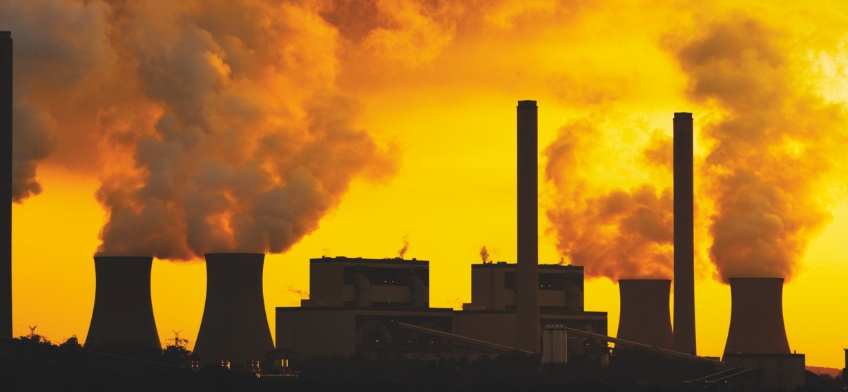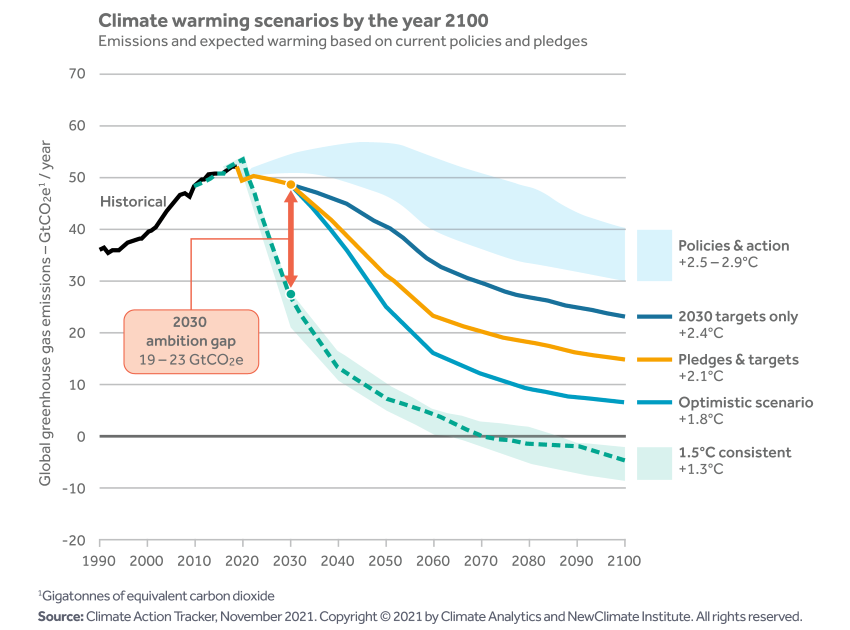What net zero pledges were made at COP26 – and how will they impact investors?

Two weeks, 200 countries, almost 40,000 delegates. Glasgow means ‘dear green place’, making it an apt location to host the 26th Conference of Parties (COP26) – the most well-attended UN climate change summit in history. Here we discuss some of the net zero pledges made and the impact these may have on investment portfolios and financial markets in years to come.
“The people alive now, the generation to come, will look at this conference and consider one thing. Did that number stop rising and start to drop as a result of commitments made here? The answer can be yes.” David Attenborough
The first week was described as ‘progress, but not nearly enough’. The notable absence of President Xi Jinping of China was blamed on a lack of video conferencing – in the age of the Zoom boom. However, 90% of the world’s nations pledged ground-breaking net zero targets, and new alliances were formed. Closer to home, the UK Government strengthened their strategy of ‘build back greener’, which originally aimed for an 80% greenhouse gas emissions reduction compared to 1990 levels, but was subsequently upgraded to net zero by 2050.
What other climate transition pledges were made at COP26?
In the second week of COP26, delegates reconvened to discuss country-specific and global actions, and began the political and technical negotiations towards a range of agreements, including one to ‘phase-down’ global coal usage. Many countries wanted the phrasing to specify ‘phase-out’, but the original agreement was watered down when China and India refused to sign it.
Leaders from more than 120 countries, representing about 85% of the world’s forests, promised to reverse deforestation and land degradation by 2030. However, one of the signatories, Indonesia’s environment minister, cited the need to cut down forests to make way for roads and infrastructure development in developing countries, saying the promise was ‘unfair’.
Countries representing more than two-thirds of the global economy promised collectively to reduce 30% of man-made methane emissions by 2030. Some scientists believe this target is over-ambitious and unachievable [2], particularly as heavyweight emitters Russia, China and India have not signed up.

How will net zero targets affect business practices and create potential investment opportunities?
As well as political, academic and NGO representation at COP26, there was significant involvement from company executives. COP26 highlighted the need for greater co-operation between the public and private sectors as governments admitted that they do not have the funding power of private capital. In response, nearly 500 firms have pledged US$130trn to support the net zero transition.
Some climate campaign groups quickly dismissed this as ‘greenwashing’, as many of these organisations continue to fund fossil fuel extraction, but we believe businesses have realised that ESG (Environment, Social and Governance) and net zero are no longer buzzwords or optional add-ons to their strategies; they need to incorporate such initiatives fully into their plans. For example, in the UK, all large companies and public enterprises will be required to publish a net zero transition plan by the end of 2024.
How will the net zero pledges made at COP26 affect investment portfolios?
The net zero pledges could influence investment themes for the future, such as the mobilisation of private capital for environmental venture funding, ESG company practices, carbon pricing, and the popularity of green bonds [3].
- ESG company risk: the increasingly urgent climate agenda will result in greater political and regulatory scrutiny for companies. Any laggards in implementing net zero strategies and ESG reporting will inevitably risk customer backlash and reputational damage. As investors, we will hold companies accountable to their ESG policies and pledges.
- Carbon pricing: while there are currently no formal, defined global standards for pricing carbon emissions, some industries are introducing their own internal carbon pricing methods [4]. The International Monetary Fund (IMF) has proposed an international carbon price floor using carbon taxes and price-setting, which could reduce emissions by up to 12.3% [5]. Carbon intensive industries will see their bottom lines hit hardest because they produce the most significant Scope 1, 2 and 3 emissions.
Investment managers from Adam & Company attended COP26 events to expand their ESG knowledge, focusing on water utilities in the UK and forestry resources in West Africa. We learnt about the impact of deforestation from the Chair of the African Group of Negotiators, Tanguy Gahouma-Bekale, and how investments into local infrastructure and research are not only improving forestry areas, but also boosting local economies. Overall, we remain hopeful for the pledges and promises made throughout COP26 and look forward to seeing the real action begin.
The COP26 net zero pledges will not directly change our investment philosophy, and we will remain diligent when making investment decisions for our discretionary clients. We continue to monitor potential climate risks to portfolios and work closely with our ESG colleagues at Canaccord Genuity Wealth Management and consider the investment theme of climate transition in 2022 and beyond.
Specifically, we will build on our research in the areas of clean and renewable energy, the sustainable food revolution and electric vehicles. We will continue to seek out market leaders in these newer industries, which offer prospects of strong growth for shareholders, and consider climate transition themes in 2022 and beyond.
Find this useful? Want to read more of our current issue of Outlook?
Speak to one of our experts
If you have any questions about the current environment or about your investments, please get in touch with us or email enquiries@adamandcompany.co.uk.
Please remember, if you hold an account with Adam & Company, you can check your portfolio value at any time, through Wealth Online or by getting in touch with your Investment Manager.
New to Adam & Company Investment Management?
If you are new to wealth management and would like to learn how this can benefit you, we can put you in touch with our team of experts that can help.
Investment involves risk. The value of investments and the income from them can go down as well as up and you may not get back the amount originally invested. Past performance is not a reliable indicator of future performance.
The information provided is not to be treated as specific advice. It has no regard for the specific investment objectives, financial situation or needs of any specific person or entity.
This is not a recommendation to invest or disinvest in any of the companies, themes or sectors mentioned. They are included for illustrative purposes only.
The information contained herein is based on materials and sources deemed to be reliable; however, Canaccord Genuity Wealth Management makes no representation or warranty, either express or implied, to the accuracy, completeness or reliability of this information. Canaccord is not liable for the content and accuracy of the opinions and information provided by external contributors. All stated opinions and estimates in this article are subject to change without notice and Canaccord Genuity Wealth Management is under no obligation to update the information.
[3] Studies as below:
Global green bond market set to hit EUR 2 trillion in three years, says NN Investment Partners | NN Investment Partners (nnip.com)
Lebelle, M.; Lajili Jarjir, S.; Sassi, S. Corporate Green Bond Issuances: An International Evidence. J. Risk Financial Manag. 2020, 13, 25. https://doi.org/10.3390/jrfm13020025
[4] Source: McKinsey
The balance between the amount of greenhouse gas produced and the amount removed from the atmosphere. We reach net zero when the amount we add is no more than the amount taken away.
Businesses giving the impression that their products are more environmentally friendly than they really are.
Find this information useful? Share it with others...
Investment involves risk and you may not get back what you invest. It’s not suitable for everyone.
Investment involves risk and is not suitable for everyone.
